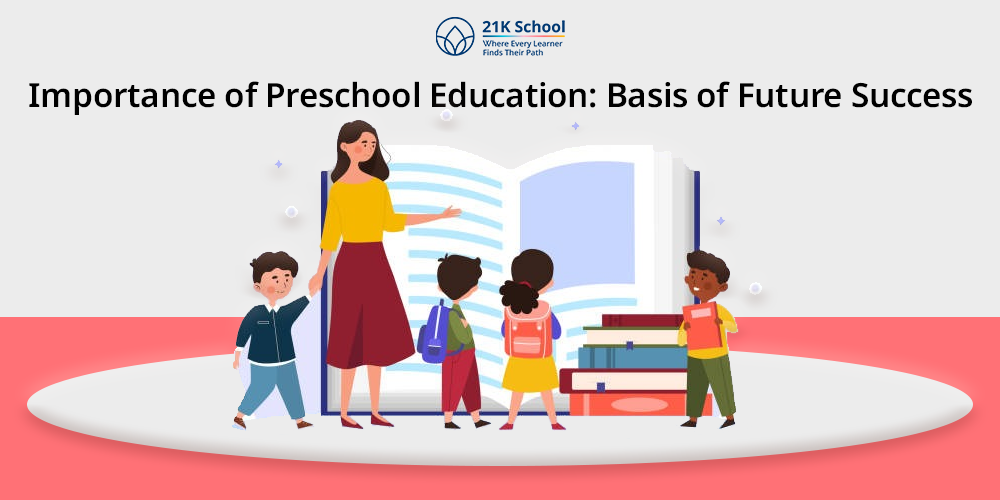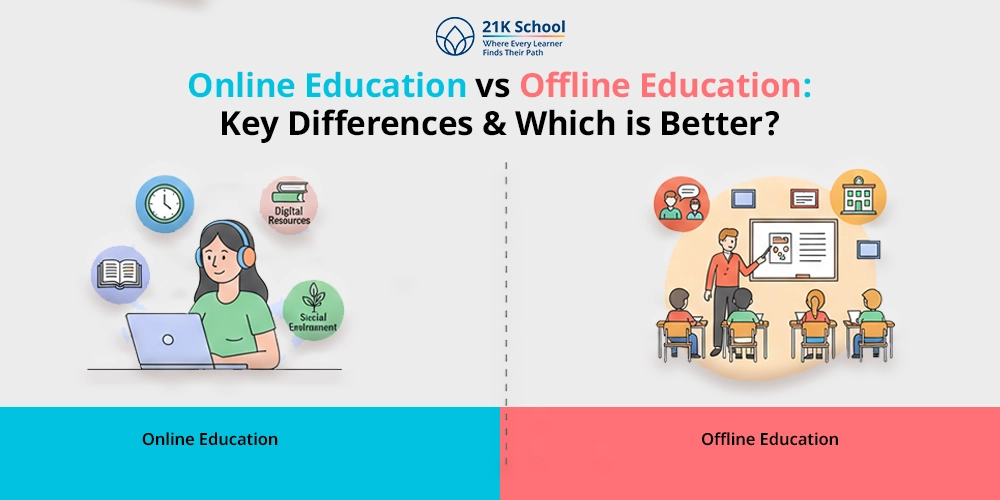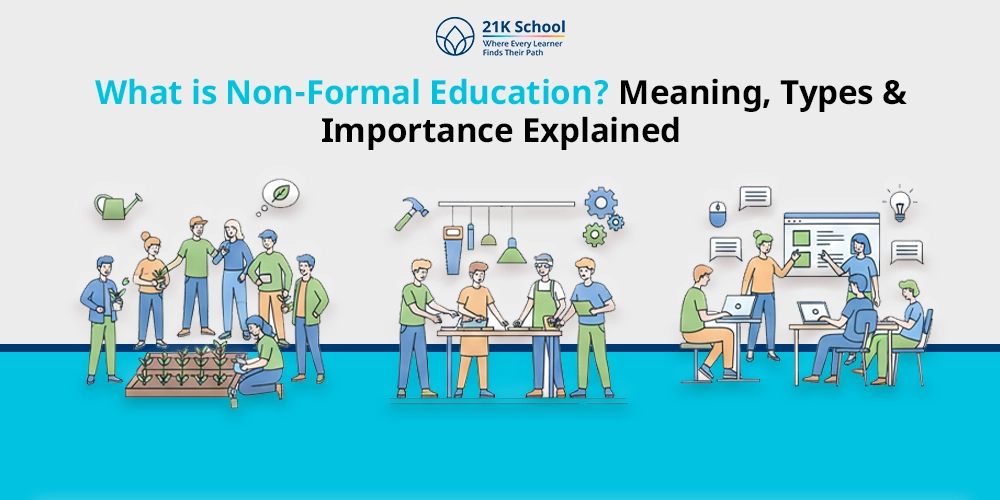
Childhood years are said to be the most critical years of life. As a matter of fact, almost 90 percent brain growth is achieved prior to the age of 6 years.
Such years form both the educational potential of a child and his/her emotional stability, social adaptivity, and character. Here, early childhood learning is made fundamental
Preschool is not a mere playground, it is a rich, well-planned surrounding that helps a child grow in a wholesome way. With the help of systematic activity, game play and story telling, children learn the most crucial tools of lifelong learning.
Preschool is the meeting ground between home and school in the age of growing pressure on the young learners. Thus, easing the burden as well as raising the efficiency of the transition.
Contents
- 1 What is Preschooler Education?
- 2 12 Importance of Preschool Education Every Parent Should Know
- 2.1 1. Language and Literacy Skills
- 2.2 2. Math and Problem-Solving Skills
- 2.3 3. Creativity and Critical Thinking
- 2.4 4. Developing Relations and Social Skills
- 2.5 5. Emotional Regulation and Self- Control
- 2.6 6. Making Empathy and Cooperation
- 2.7 7. Social and Emotional Development
- 2.8 8. Independence and Self-Help Skills
- 2.9 9. Academic Concepts Early Exposure
- 2.10 10. Greater Academic Performance
- 2.11 11. Learn Motor Skills
- 2.12 12. Cognitive Development
- 3 To Wrap It Up
What is Preschooler Education?
Preschool education is the early years educational provision effective with children aged 3 to 5. These children are being taught before they go to kindergarten or primary school.
It seeks to develop the children through five major areas which are cognitive, emotional, social, physical, and linguistic. Further, the online preschool programs tend to take a play and academic approach in which children will be allowed to explore their surroundings.
This helps them to connect with other children, and practice activities in order to develop their perception of the world. It is not like any strict academic training.
Preschool education is the development of curiosity, confidence and the necessary skills by means of enjoyable, involving and meaningful experiences.
12 Importance of Preschool Education Every Parent Should Know
While preschool education is not mandatory, it still holds its benefits in the life of preschoolers.
Parents and teachers want their kids to excel in forming social bondings, peer interaction, basic mannerism, etc. So that these kids don’t feel lost and pointed out in academic settings.
1. Language and Literacy Skills
One standout improvement brought about by preschool education is language development. Children get an idea of linguistic structure, constructing sentences, and vocabulary through conversation, stories, rhymes and songs.
Books, story-telling activities, and verbal communication during classes enhance listening skills, talking skills, and early reading. This early background highly affects reading fluency as well as comprehension at later school life.
Guardians must understand the importance of language skills for their kids
2. Math and Problem-Solving Skills
Preschool comes up with the primitive form of mathematics in a playfully concrete form. Counting blocks, naming shapes, classifying items by size or color teach children numbers, patterns, sequences, and ways to solve problems.
The small activities with logic and numeracy develop the foundation necessary in succeeding in mathematics later in life.
Explore top counting math activities for preschoolers from here.
3. Creativity and Critical Thinking
Open-ended activities such as puzzles, pretend play and building with materials promote critical thinking skills and creativity. Children are to be questioned, to make some guesses, to investigate various variants.
These experiences come to refine their logic and creativity, two important skills in the modern dynamic world. Preschoolers are commonly free to find various ways of solving a problem, enhancing creative problem-solving techniques.
4. Developing Relations and Social Skills
Preschool is the first organized experience in which the young people interact with each other. They also get taught how to share, turn-taking, cooperate, solve disputes, and make friends.
These early social experiences will create the feeling of belonging, and find how children socialize with each other. This is crucial in the future as they enter classroom life.
5. Emotional Regulation and Self- Control
The toddler age group is known to have difficulty in controlling such negative feelings as anger, frustration or jealousy. Preschool is a protective environment where teaching helps them to identify, express, and manage emotions.
Children develop practices like waiting in line, taking turns, making orders, and calming down. Through these basic activities they acquire patience and school readiness characteristics and become more emotionally resilient.
Go through these self awareness activities for students that help them regulate their emotions well with having fun.
6. Making Empathy and Cooperation
A preschool classroom is a place that exposes children through backgrounds, culture, and behavioral diversity. They learn to recognize the feelings and views of others through activities like collaborative games and storytelling.
This process promotes collaborative learning, kindness, and tolerance, making children good team partners and socially aware people.
7. Social and Emotional Development
Preschool makes the child know what he/she is and how he/she can fit in the world. Children are assisted by the teachers in creating self-confidence, resilience, and positive self-image.
Social milestones like eye contact, play, expression of needs and settlement of conflicts are achieved through ongoing guidance and encouragement. It is during this phase that development of emotional preconditions, mental well-being, and flexibility takes place for the future.
8. Independence and Self-Help Skills
Preschool teaches children to work independently on things like wearing shoes, clean-up, going to the bathroom or choosing activity. These activities make them come up with self-reliance, responsibility, and decision-making.
The children learn confidence and a sense of control over their own environment. These are essential to learning and development, by being trusted to perform small chores.
Through these Ways You Can Support Your Child to Study Independently from Home.
9. Academic Concepts Early Exposure
Although it is based on play, children are slowly introduced to academic topics. Such as days of the week, colors, seasons, animals, the body of a human being or simple science.
This exposes him/her to curiosity and reinforces a general knowledge on the world. Through practical learning, the kids acquire the basics of learning.
This further makes them adapt to the kindergarten or formal school environment very fast.
10. Greater Academic Performance
Various longitudinal studies have shown that children enrolled in quality preschool programs are more likely to achieve better in school. Mostly by exhibiting less behaviour problems, performing better in tests and graduating.
Development of cognitive and social-emotional learning in preschool allows for an easier transition to the later years of academic performance.
11. Learn Motor Skills
Preschoolers do both fine motor activities (drawing, using scissors, buttoning clothes), as well as gross motor activities (running, climbing, jumping).
Such activities tune co-ordination, strength and muscle control which are necessary in the day-to-day activities of writing, and sports. The preschool therefore physically prepares a child to perform educational activities.
12. Cognitive Development
Preschool education is all about cognitive development of children. Tasks that require memory games, problem-solving, matching and categorizing activities aid in thinking, attention span and memory retention.
Children learn cause and effect, make predictions and use symbols in play. All of which develop the brain and prepare them for advanced learning.
Find out the best shape activities for preschoolers to keep them engaged.
To Wrap It Up
Preschool education is more than an early exposure to academic studies. It is a life experience that educates the mind, body and heart.
It promotes the necessary skills which the children take with them throughout their education and in the course of their life. Preschool focuses on children in terms of intellect, emotion, social, and physical development and creates a platform of lifelong achievement.
Preschool is no longer a luxury. It is a must in the world wanting to become adaptive, highly emotionally integrated, and capable of critical thinking.
When you invest in early childhood education, you invest in a smarter, nicer and more competent generation. The message is simple to parents, educators and policymakers alike: early beginnings matter.



